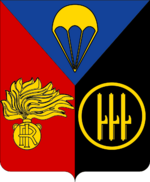Royal Carabinieri Operations Command (Kingdom of Italy)
The Royal Carabinieri Operations Command (Comando Reali Carabinieri per le Operazioni) is the Command with the mission of overseeing all surveillance operations, tactical control of the territory, personal security and mobile operations, including special operations under the responsibility of the Corps, which are decided by the Commander General.
The Command is also the main reservoir of personnel for missions abroad in support of the other Armed Forces for tasks other than the Military Police.
Organization
The Command, headed by General of the Army Corps, is made up of the Command Office, the General Staff, and three Divisions:
- Mobile Units Division;
- Territory Control Division;
- Personal Security Division;
- Special Public Security Units Command.
Mobile Units Division
The Carabinieri Mobile Units Division (Divisione Carabinieri Unità Mobili, officially shortened in D.U.M. CC.) is a Division-level command which controls all riot units, as well as other units specialized in military-type missions. Currently, CC.RR. Mobile units are subdivided into the support units and the riot units.
All such units may also be deployed in the Realms of the Italian Empire, should the need arise. Usually, four to six units are always deployed in the Realms of the Italian Empire on a rotatory basis, in order to provide support to the local governments and close protection to Italian quarters in Valona, in Tripoli, in Mogadiscio, in Asmara, in Tunisi and in Addis Abeba.
Support units
Carabinieri support units are those units tasked with dealing with special assignments and sudden emergencies. These units are grouped within three Carabinieri Regiments:
- 1st Carabinieri Paratroopers Regiment "Italia", consisting of two Battalions:
- Special Unit of Public Security Paratroopers (head-quartered in Pavia), for sudden crisis and emergency;
- Royal Carabinieri Paratroopers Battalion "Tuscia" (headquartered in Naples), for sudden crisis and emergency;
- 2nd Carabinieri Cavalry Regiment "Pastrengo", consisting of two Squadrons Groups:
- 1st Carabinieri Cavalry Squadrons Group (head-quartered in Rome): it is organised into three Squadrons (based in Cagliari, Palermo and Bari) and used in order to reinforce public order services as well as for operations in rural areas;
- 2nd Cavalry Squadrons Group (head-quartered in Milan): it is organised into three Squadrons (based in Milan, Florence and Padua) and used in order to reinforce public order services as well as for operations in rural areas;
- 3rd Carabinieri Support Regiment "Volturno", consisting of 5 Carabinieri Counter-guerrilla Battalions (head-quartered in Cagliari, Vibo Valentia, Naples, Rome and Milan);
Riot units
The Mobile Units Division controls 24 riot Battalions headquartered in various cities for a total of 25,000 men assigned to riot suppression tasks. These Battalions are grouped into five Regiments:
- 4th Carabinieri Regiment: HQs in Turin, in charge for riot Battalions based in Turin (I Carabinieri Battalion), Moncalieri (Turin province, II Carabinieri Battalion), Milan (III Carabinieri Battalion), Genoa (IV Carabinieri Battalion) and Brescia (V Carabinieri Battalion).
- 5th Carabinieri Regiment: Padua (VI and VIII Carabinieri Battalions), Pordenone (VII Carabinieri Battalion), and Bologna (IX Carabinieri Battalion).
- 6th Carabinieri Regiment: HQs in Rome, in charge for riot Battalions based in Rome (X and XIV Carabinieri Battalions), Florence (XI Carabinieri Battalion), Senigallia (XII Carabinieri Battalion), and Perugia (XIII Carabinieri Battalion).
- 7th Carabinieri Regiment: HQs in Cagliari, in charge for Riot Battalions based in Cagliari (XV Carabinieri Battalion), Sassari (XVI Carabinieri Battalion) and Ajaccio (XVII Carabinieri Battalion).
- 8th Carabinieri Regiment: HQs in Naples, in charge for Riot Battalions based in Naples (XVIII and XXIV Carabinieri Battalions), Bari (XIX Carabinieri Battalion), Catania (XX Carabinieri Battalion), Palermo (XXI Carabinieri Battalion), Reggio Calabria (XXII Battaglione Carabinieri) and in Taranto (XXIII Battaglione Carabinieri);.
Paratrooper Carabinieri Counter-guerilla Battalions
The Royal Carabinieri maintains five Carabinieri Paratroopers Counter-guerilla Battalions (Battaglioni Carabinieri Paracadutisti Antiguerriglia), head-quartered in Cagliari, Vibo Valentia, Naples, Rome and Palermo. In wartime, each Paratrooper Carabinieri Counter-guerilla Battalion is to be integrated within an individual Army Alpine Brigade. The Cagliari Battalion maintains the traditional name of Banditry Prevention Unit (Reparto Prevenzione Banditismo). The Battalions have uniforms, armament and equipment specifically designed for the particular type of service performed.
Personal Security Division
The Personal Security Division is the entity responsible for the personal security. The Ministry of Interior, through the Directorate-General of Public Security and the General Command of the Royal Carabinieri, ensures the carrying out of personal protection services outside the Duce and the military.
The functional area of responsibility relates to the preservation and protection of eminent persons (both for institutional and political reasons) both domestic and foreign, as well as persons who are subject to hazards or threats, in the person of his or her family. Outside of the high political personalities, the dangers which the Personal Security Division must respond to are of a terrorist nature or related to organized crime, drug trafficking, arms trafficking or radioactive material trafficking. Finally, the Division is responsible to avoid the dangers related to activities of foreign intelligence. The Division may also adopt measures to arrange flights to ensure the safety of the leading figures or other persons subject to dangers or threats.
The special tasks of the Division include the collection and analysis of all the information related to personal situations at risk that O.V.R.A., the Military Information Service, the Confidential Affairs Division, the judiciary, the police and security forces and the M.V.S.N. are required to provide, taking care also connections with the provincial offices. The Division also deals with the services and personnel strategic and operational planning, technical training of personnel employed in the security services and the check of the special tools used for protection services and their supervision. Finally, the Division also provides the activation of emergency procedures.
The head-quarters personnel can be assigned to the Division from all State administrations and corps, from all security forces, both Party and State ones, while the security services and surveillance are carried out from specialized offices and units of Royal Carabinieri or the M.V.S.N.
For reasons of exceptional and temporary nature, drivers of vehicles in use at high personalities may be granted the powers and the functions of Agent of Public Security, in order to allow the performance of a more effective action to prevent and protect the life of these personalities. Drivers appointed Agents of Public Security are allowed to use in vehicles conducted siren and revolving blue light beacon. The Personal Security Division consists of six Offices and a Central Advisory Commission:
- Office I - General Affairs and plans;
- Office II - Analysis;
- Office III - International relations: support to INTERPOL and relations with foreign police bodies for protection tasks;
- Office IV - Operations;
- Office V - Training;
- Office VI - Logistics;
- Central Advisory Commission.
Central Advisory Commission
The Central Advisory Commission (It: Commissione Consultiva Centrale) is a body of the Division; the Commission, at the request of the Divisional Head, provides its opinion on the adoption, modification and revocation of protection measures and surveillance, as well as on all other matters, related to measures of protection and supervision, that the Director deems to submit.
The Division uses the Commission for the adoption of protective and supervision measures. The Commission is chaired by the Divisional Head and consists of one representative from each of the police forces involved (including civilian officials), a representative of the O.V.R.A., a representative of the Militia, a representative of the Military Information Service, and three representatives of the National Fascist Party.
Section I - Central Protection Section
Section I - Central Protection Section (Sezione Centrale di Protezione, S.C.P.) implements special programs of protection and assistance to witnesses and other protected persons. The assistance programs include reintegration into social and working context. The Section also maintains relations with the Judicial bodies and Public Security peripheral organs, as well as with all the other ministries involved in the implementation of protective measures. The Section has as its own support structure 11 Inter-Provincial Operational Offices. The Section in turn consists of 6 Offices, led by Quaestors, 2nd Class (or equivalent): General and Anagraphic Affairs, Psychological support, Economic support, Witnesses, Collaborators of Justice and Special and Temporary Programs.
Peripheral organization
Any measure taken by the Director is communicated to the Prefect and Quaestor of the province affected by the execution of the decision adopted. In every Prefecture, as part of the Sixth Division, operates the Provincial Office for Personal Security, responsible for collection and preliminary analysis of information related to personal situations at risk, as well as information connections with the Central Directorate. The Office makes use of the police forces in the province (Public Security and others), M.V.S.N. and officers specifically designated and appointed. The Prefect convenes and presides special coordination meetings, with the participation of the Quaestor, the commanders of the other police forces that may be present in the Province, the M.V.S.N. Commander and the official in charge of the Office for Personal Security. It can also be called on the Federal Secretary of the P.N.F.
The Prefect, relying upon data collected and on coordination meetings, makes recommendations to the Central Directorate.
Special Public Security Units Command
The Carabinieri Public Security Special Units Command (Italian: Comando Carabinieri Unità Speciali per la Pubblica Sicurezza) or shortly as C.C.U.S.P.S., is the domestic special forces unit of the Carabinieri. It has several missions which include counter-terrorist actions, urban warfare, underwater operations, hostage rescue, riot control, and other high-threat criminal actions and, for military duties, direct actions, as well as support to special operations forces. Members of the unit receive extensive training from selected Army instructors and also at the Police Schools. The Command is Regiment-sized (four Battalion-sized Groups) and depends only on the Carabinieri General Command; it is to note that the Command lies outside the Mobile Units Division, because its units are employed in confidential missions unrelated to the public order protection. All companies work under the direction of the Police and Carabinieri regional commands to which they are assigned, but can also receive tasking from Rome.
Carabinieri Special Operations Group
The Carabinieri Special Operations Group (Italian: Gruppo Carabinieri Operazioni Speciali) or G.O.S., is the special operations unit of the Carabinieri. It has several missions which includes search and destroy, infiltration and reconnaissance actions. Members of the unit receive extensive training at the Carabinieri School and also from selected Army instructors. All three companies work under the direction of the Army regions to which they are assigned, but can also receive tasking from their headquarters in Rome.






